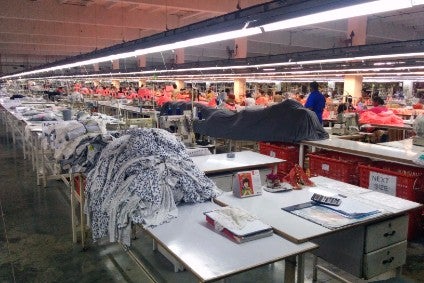
A new survey of 35 fashion brands and retailers has found that despite mounting public pressure, 40% have made no public commitment to pay in full for completed orders.
However, the research by the Business & Human Rights Resource Centre (BHRRC), which is based on company responses and publicly available information, found the remaining 60% said they would pay for complete orders in full.
Millions of garment workers face destitution after conflicting responses from major international clothing brands to Covid-19. Despite some leading brands like H&M, Inditex and Adidas publicly committing to pay for orders placed before the pandemic, a significant number have cancelled orders or demanded huge discounts.
These decisions are having a devastating impact on garment workers in supply chains: as orders dry up, millions of workers have lost their jobs or gone up to two months without being paid wages, while those still working are earning a fraction of their usual pay. This has led to workers from Pakistan and Bangladesh to Cambodia to take to the streets in demand of wages as they face futures with no food, housing or work.
The survey highlights that the pre-existing power imbalance between clothing brands, suppliers and workers has been exacerbated by the pandemic.
Among the findings:
- One-fifth (23%) of companies have demanded discounts on orders already agreed. Debenhams has reportedly requested a 90% discount.
- Answering questions on their pandemic response, 18 brands – including H&M, Inditex and Burberry – showed new transparency around payment times which directly affects workers’ wages.
- Companies including Arcadia Group (Topshop) and Gap not only failed to respond to the survey buy also made no commitment to pay for completed orders.
- 23 companies said they have taken steps to make sure workers are paid for March and April, and 19 companies are helping suppliers through access to local finance. Yet a large number of workers have not been paid for these months or are being paid only part of their wages, prompting large protests by workers in Cambodia and Bangladesh.
- Eight companies (23%) have delayed payment, extending their usual payment times to suppliers, with Primark extending up to 180 days (six months). By contrast, three brands (Hermès, N Brown, Zalando) said they have shortened payment times for some suppliers to help cashflow during the crisis.
- 17 companies have signed the International Labour Organization’s Call to Action to support garment manufacturers during the economic disruption caused by the COVID-19 pandemic, and to protect garment workers’ income, health and employment. However, concerns are mounting that the unfolding humanitarian crisis, with workers being laid off and owed wages, means that brands must commit to a relief fund.
“In the face of international disruption caused by Covid-19, too many fashion brands are only looking to protect their own profit at untold cost to workers who make the clothes they sell,” says Thulsi Narayanasamy, senior labour researcher at Business & Human Rights Resource Centre.
“Hard-nosed refusal to pay for orders in this pandemic is only an extension of how many fashion brands do business: driving down costs and dodging their share of the risk in supply chains.
“In contrast, some brands have stood out against this norm, showing leadership. This can build trust with suppliers and workers on whom their successful recovery will depend. Laggard brands must follow this example or risk undermining efforts to protect workers.
“Brands being transparent about their action should be applauded as this allows civil society and workers to monitor whether commitments are being met.
“Ultimately, without binding industry standards to enforce fair purchasing practices there is no level playing field for responsible brands, and no protection for workers. Instead callous companies can under-cut with impunity. This has left millions of women and migrant workers in fashion’s supply chains unable to put food on the table for their children, and wondering how they will pay the rent.”
Results of the research have been made available through Business & Human Rights Resource Centre’s new Covid-19 response dashboards, which track information on global brands’ actions in response to the pandemic and the impact on workers around the world.
Separately, another online tracker created by the Worker Rights Consortium (WRC) in association with Penn State’s Center for Global Workers’ Rights (CGWR) is monitoring the response of leading apparel and footwear brands and retailers to their suppliers and workers during the coronavirus crisis.



